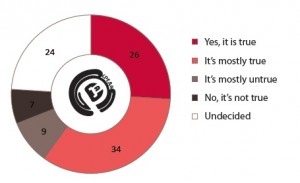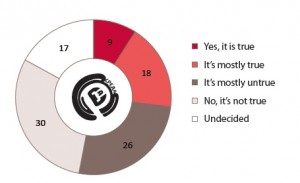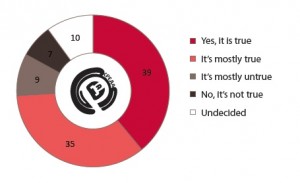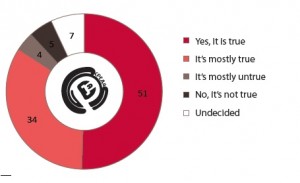Science and Religion
06/22/2011“The ultimate step of reason is to recognize the existence of a multitude of things that are beyond our knowledge, and if the mind does not come to this knowledge – it is a very weak mind.»
Blaise Pascal (1623-1662) French physicist and mathematician
The results of the All-Russian representative survey conducted by the service SREDA (field work: Public Opinion Foundation “PENTA”, sample 1500 people)
74% of Russian citizens are convinced the world is cognoscible, and 85% of respondents believe in science. In this situation, Russians show a generally positive attitude towards religion. In fact, 60% of respondents believe that scientific study of religious life is beneficial to society, and 56% of respondents disagreed with the assertion that religion serves to manipulate people.
In the poll the respondents were asked to answer the following questions:
– Is the following statement true or false in your opinion? “Scientific study of religious life benefits the society.”
– Is the following statement true or false in your opinion? “Religion serves to manipulate people –It brings to many deceit and delusion.”
– Is the following statement true or false in your opinion? “I believe that the world is cognoscible.”
– Is the following statement true or false in your opinion? “I believe in science.”
60% of Russians believe that the scientific study of religious life is beneficial to society. More often than on average, this was reported by educated respondents, entrepreneurs/managers, and urban residents. Russians living in villages rarely think of the study of religious life as beneficial to society.Also more likely to recognise the benefits of studying religious life were Muslims and church-going Christians belonging to the Russian Orthodox Church. Yet Russians who consider themselves Orthodox Christians but do not belong to the Russian Orthodox Church, by contrast, somewhat less frequently considered the study of religious life good for the society.
16% of all respondents did not see any benefit in the study of religious life. At that, men said this more frequently than women. More likely to give a negative answer were non-believers and respondents who don’t consider themselves to be superstitious.
24% of Russians were undecided on this matter. More often difficulty in giving a definite answer was experienced by Russians over 65, less educated respondents and citizens with low material wealth.
56% of Russians do not agree with the assertion that religion serves as a means of manipulation, deceit and confusion.
More likely to say that religion is not a tool of manipulation were respondents with higher education (or incomplete higher education), citizens working in the field of science or education, parents of large families and people over 65 years old.
In addition, religion was frequently described as not being a means of manipulation by various believers: Orthodox Christians, non- Orthodox Christians, and Muslims.
On the contrary, religion is more often seen as a means of manipulation by non-believers and those who believe in God but do not belong to any particular religion.
In total, 27% of Russians think that religion serves as a means of manipulation. Most often this was reported by young people aged 18 to 34 years and the wealthiest respondents.
Women are less likely than men to agree with the assertion that religion is a means of manipulation.
17% of all respondents did not have any definite opinion (were ‘undecided’) about whether religion is a means of manipulation or not. More often difficulty with answering this question was experienced by the poor and uneducated citizens.
The survey also found that 74% of all respondents believe that the world is cognoscible.
The opinion that the world is cognoscible is most often shared by representatives of the following social groups: people under age 35, students and pupils, entrepreneurs and executives.
Interestingly, superstitious respondents were also more likely to say that the world is cognoscible.
Least frequent to positively answer this question were those respondents working in the field of science or education, as well as regularly church-going Orthodox Christians.
Difficultly in giving a definite answer (“undecided) was experienced by 10% of respondents. More often unable to decide whether or not the world is cognoscible were people over age 65 and citizens with below-average education.
Respondents who said that the world is cognoscible more often live in the Central, Volga and Far Eastern federal districts, in cities of 250,000 to 1 million residents, as well as in Moscow. Respondents living in the Urals, South and North – Caucasus federal districts and rural residents, by contrast, somewhat less frequently talked about cognoscibility of the world.
The vast majority of respondents (85%) agreed (or mostly agreed) with the statement “I believe in science”.
More often faith in science was declared by respondents with higher or incomplete higher education, the wealthiest citizens, young people aged 25-34 years and Russians who consider themselves happy.
Also more likely to say that they believe in science were Muslims and citizens who consider themselves Orthodox, but never attend the Communion.
Somewhat more rarely declaring a conviction in science was low- income respondents and parents who are raising three or more children.
Only 9% of Russian citizens stated that they do not believe in science (men more often than women). This lack of conviction in science was mainly shown by respondents with a low level of education.
7% of all respondents could not give any specific answer (were 62 ‘undecided’). Difficulty in giving a definite answer was more often seen in respondents over age 65 years and low-income pensioners.
It turns out that much more Russians believe in science than was previously suggested by sociologists of religion, based on the results of an expert survey conducted by SREDA Service in the spring of 2011 (50 experts). According to experts’ forecast about 50% of Russians have faith in science. In reality, however, 85% of those surveyed believe in science. This is the greatest deviation
of the real results from the experts’ forecast in the nationwide representative survey. With regards to the other issues, the forecasts given by sociology experts were surprisingly accurate.







